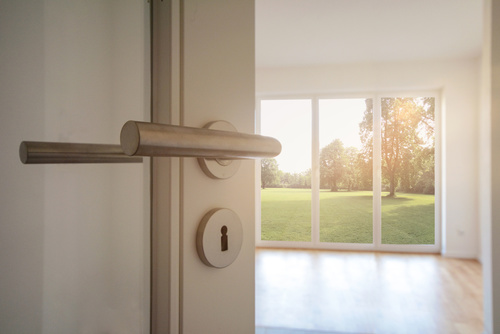Hier sind Sie gut informiert:
Unabhängig davon, ob Sie eine Immobilie erwerben oder ein Haus bauen wollen, die damit verbundene Finanzierung stellt wahrscheinlich die größte Investition Ihres Lebens dar. Ein solches Vorhaben wirft deshalb immer Fragen auf, gerade im Hinblick auf die Finanzierung.
Wir freuen uns darauf, Ihre Fragen umfassend zu beantworten. Für alle, die sich vorab informieren möchten, haben wir in unserem Ratgeber die wichtigsten Aspekte der Baufinanzierung zusammengefasst. Gegliedert ist der Ratgeber nach den Gründen für eine Finanzierung: Kauf einer Immobilie, Neubau, Umschuldung und Anschlussfinanzierung, Renovierung und Modernisierung sowie Kapitalanlage. So haben Sie die Möglichkeit, sich zielgerichtet über Ihr Finanzierungsvorhaben zu informieren, um so bei einem Beratungsgespräch sofort die richtigen Fragen zu stellen.

Zum Thema: Kaufen
Sie wollen eine Immobilie kaufen?
Egal ob Sie einen Kauf oder einen Neubau zu finanzieren haben, bei jeder Finanzierung stellen sich immer zuerst die gleichen Fragen: die Art der Finanzierung, die Gestaltung der Zinsfestschreibung, die Laufzeit und die Zinskonditionen. Dem ersten Anschein nach ist der Kauf einer Immobilie dabei leichter zu kalkulieren als ein Neubau. Die Kosten umfassen den Kaufpreis plus Erwerbsnebenkosten (Grunderwerbsteuer, Notar- und Gerichtskosten für den Kaufvertrag und gegebenenfalls noch eine Maklercourtage). Dazu kommen im Rahmen der Finanzierung noch die notarielle Beurkundung und die Eintragung der entsprechenden Grundschuld ins Grundbuch. Die Kosten dafür betragen normalerweise etwa 0,5% der Darlehenssumme.

Worauf Sie beim Kauf achten sollten
Ausgehend von dieser Kalkulationsbasis und den Ihnen zur Verfügung stehenden Eigenmitteln, ergibt sich die Summe, die Sie finanzieren müssen. In diesem Zusammenhang ist die wichtigste Frage, wie hoch Ihr Darlehen maximal sein darf. Weiter ist zu klären, welche Fördermittel für Sie in Frage kommen. Je nach Alter und Zustand der Immobilien sollten Sie auch schon über Maßnahmen zur Renovierung und Modernisierung nachdenken und diese eventuell sofort in Angriff nehmen. Gerade hierbei ist wichtig, dass die finanzierende Bank auch günstige KfW-Darlehen als Ergänzung zu Ihrer Baufinanzierung anbietet, um den Aufwand für die Finanzierung möglichst niedrig zu halten.Insofern ist es wichtig, bei der Finanzierung alle zukünftigen Optionen möglichst von Anfang an zu berücksichtigen. Unsere Berater stehen Ihnen dafür gerne mit ihrer Kompetenz zur Seite.

Zum Thema: Bauen
Sie wollen bauen?
Wenn Sie bauen wollen, stellen sich auch hier wieder alle Fragen, die jede Baufinanzierung mit sich bringt. Welche Art von Finanzierung soll ich wählen? Wie sieht es mit der Zinsfestschreibung und den Konditionen aus? Was ist bei Tilgung und Laufzeit für mich am günstigsten? Bei einem Neubauvorhaben sollten Sie zusätzlich auf die Auszahlungsbedingungen, eine mögliche Nachfinanzierung und die Nebenkosten der gesamten Finanzierung achten.

Auszahlungsbedingungen
Bei einem Neubau ist eine pünktliche Auszahlung besonders wichtig. Die besten Zinskonditionen nutzen nichts, wenn der Darlehensbetrag nicht rechtzeitig ausbezahlt wird und Sie Ihr Grundstück oder die Handwerker nicht pünktlich bezahlen können. Aus diesem Grund müssen die Auszahlungsbedingungen genau auf Ihr Bauvorhaben abgestimmt werden, sonst drohen ein Baustopp oder eine teure Zwischenfinanzierung. Eine fachmännische Gestaltung Ihrer Finanzierung und die Auswahl des richtigen Partners sorgen hier für einen reibungslosen Ablauf.

Vergessen Sie nicht die Nebenkosten
Während eines Hausbaus kommt ein zunächst zusätzlicher finanzieller Aufwand auf Sie zu: Sie finanzieren das Grundstück und dann ab Baubeginn die anfallenden Baukosten. Parallel zahlen Sie weiter Miete und später die Kosten für den Umzug. In dieser Phase, die sich über mehrere Monate hinziehen kann, ist es erforderlich, die Nebenkosten für die Finanzierung so gering wie möglich zu halten. Eine Reihe von Punkten sollten Sie dafür berücksichtigen: Wann sind die ersten Zinszahlungen fällig? Sind Bereitstellungszinsen zu zahlen? Welche Gebühren für Gutachter und die Eintragung der Grundschuld müssen entrichtet werden? Eine vorausschauende Planung hilft Ihnen hier, unnötigen Aufwand zu vermeiden.
Eine umfassende und kompetente Beratung schafft auch hier die Grundlage für eine reibungslose Finanzierung Ihres Neubauvorhabens. Unsere Mitarbeiter beraten Sie dazu gerne ausführlich.

Zum Thema: Umschulden
Sie wollen umschulden und brauchen eine Anschlussfinanzierung?
Ganz anders als beim Erwerb oder Neubau einer Immobilie sieht die Situation aus, wenn Ihre Finanzierung nach mehreren Jahren ausläuft und Sie eine Anschlussfinanzierung benötigen. Bei einer solchen Umschuldung ist ein Wechsel zu einer anderen Bank heute problemlos möglich. Die eingesparten Zinsen übertreffen auf jeden Fall deutlich die Kosten für den Wechsel des Finanzierungspartners. So lässt sich unter Umständen schnell ein fünfstelliger Eurobetrag bei den Zinszahlungen einsparen. Diese Chance sollten Sie nutzen und sich rechtzeitig Angebote für eine Anschlussfinanzierung einholen. Allein auch deshalb, weil das Angebot Ihrer Hausbank keineswegs immer das günstigste ist.

Denken Sie früh genug ans Umschulden
Über Ihre Anschlussfinanzierung sollten Sie früh genug nachdenken. Schon 12 Monate vor Ablauf Ihrer Finanzierung lohnt es sich, Angebote einzuholen und in Ruhe zu vergleichen. Ein Gespräch mit einem unserer Berater reicht schon aus, um zu erfahren, welches Sparpotential Ihnen eine optimale Umschuldung eröffnet. Möglichkeiten gibt es viele – auch wenn Ihre alte Finanzierung noch länger läuft. Mit einem Forward-Darlehen können Sie sich beispielsweise die aktuell geltenden Zinskonditionen bis zu fünf Jahre im Voraus sichern. Nach zehn Jahren sind Sie in der Lage, Ihre derzeitige Finanzierung ohne teure Vorfälligkeitsentschädigung zu kündigen, um eine günstigere Anschlussfinanzierung abzuschließen. Und selbst bei einer Vorfälligkeitsentschädigung für Ihr altes Darlehen kann eine Umschuldung durchaus noch günstiger sein. Wir beraten Sie gerne unverbindlich.

Zum Thema: Modernisieren und renovieren
Sie wollen modernisieren oder renovieren?
Mit der Zeit braucht auch Ihre Immobilie eine Renovierung oder Modernisierung. Wenn Sie die notwendigen Maßnahmen zu lange aufschieben, vergrößert sich später nur der Erhaltungsaufwand. Jede Maßnahme – egal ob Modernisierung oder Renovierung – erhöht den Wohnwert Ihrer Immobile und damit auch Ihre persönliche Lebensqualität. Sinnvolle Instandsetzungsarbeiten machen sich teilweise schnell über Einsparungen bezahlt – beispielsweise bei den Heizkosten. Fehlende Eigenmittel können Sie dabei durch eine maßgeschneiderte Finanzierung ersetzen, die zusätzlich mit günstigen Fördermitteln wie KfW-Darlehen ergänzt wird.

Zum Thema: Kapitalanlage
Sie nutzen Ihre Immobilie als Kapitalanlage?
Nicht jeder der eine Immobilie erwirbt, nutzt diese auch später, um darin zu wohnen. Immobilien sind eine der sichersten Kapitalanlagen, wenn die zugrunde liegende Investition gut geplant ist und kompetent begleitet wird. Die möglichen Steuervorteile sollten dabei nicht das alleinige Kriterium sein. Mindestens genauso wichtig sind die Lage und der Zustand der Immobilie. Die Höhe der Mieten, die aktuelle Nachfragesituation und die Besonderheiten des regionalen Marktes sind weitere wichtige Faktoren, die die Rendite Ihres Anlageobjekts beeinflussen. Jede Immobilie erfordert eine individuelle Bewertung, da je nach Nutzung und Art unterschiedliche gesetzliche und steuerrechtliche Regelungen gelten. Eine wirklich gute Beratung muss alle Gegebenheiten, die auf den Erfolg Ihrer Anlageentscheidung einwirken, berücksichtigen. Wir bieten Ihnen hierzu eine umfassende Beratung, die Ihnen schon im Vorfeld der Kaufentscheidung hilft, die Weichen in die richtige Richtung zu stellen. Lassen Sie sich ruhig unverbindlich beraten.





